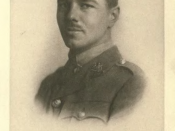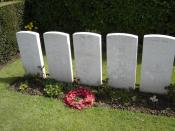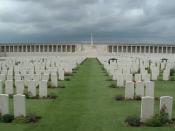Wilfred Owen once wrote, "All a poet can do today is warn. That is why the true Poets must be truthful." Keeping in line with his pronouncement, Owen addresses the true nature of war in his poetry and counteracts the popular message that war is noble and glorious. In early drafts of "Dulce et Decorum Est," Owen ironically dedicates it to Jessie Pope, a writer of children's books and conventionally patriotic poetry. Owen's depiction of an incident between troops and poisonous gas clearly denies the tenet of resplendent patriotism spread by war recruiters and idealistic poets, such as Pope. By combining gruesome imagery and effective metaphors with the subtle nuances of the poem's form, Wilfred Owen decries the belief of war's glory in "Dulce et Decorum Est."Owen initiates the reader to drastic contrast between the real and purported soldiers' lives from the onset of the poem.
Even the title is ironic. Owen quotes the beginning part of the phrase, "Dulce et decorum est / Pro patria mori," which means "It is sweet and fitting to die for one's country." There is, however, nothing that is sweet in his depiction of war. The similes "Bent double, like beggars under sacks" and "coughing like hags" give the impression that the characters are weak, dirty and poor. However, these "beggars" and "hags" are soldiers, men in their prime. If the conditions are such that strong, young men are no longer healthy or capable of standing tall, then the situation must be deplorable. By portraying the soldiers in this sordid light, Owen begins to negate the glory of war.
Owen refutation continues as his use of imagery allows the reader to not only picture, but understand the poor environmental and physical conditions. "And towards our distant rest began to trudge.



Well written
excellent....great essay
0 out of 0 people found this comment useful.